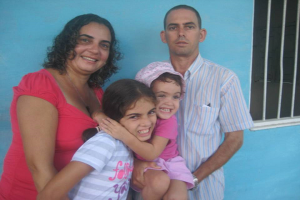
Taguayabon, Cuba – I could have written a simple informative note about one of the many arrests carried out by Cuban State Security agencies during the days leading up to the CELAC Summit in Havana. But in this case I was both eyewitness and victim, and had to deal with the fact that my daughters saw it all.
On Saturday January 25, my husband, the Baptist pastor Mario Felix Lleonart, and I, together with our daughters, Rocío, 13, and Rachel, 5, left our home in Taguayabón, intending to travel to the neighboring city of Remedios to spend a relaxing family afternoon. We were stopped by two State Security agents, dressed in civilian clothes, riding a small Suzuki motorcycle, who approached my husband and told him he was under arrest.
The situation became very tense a few minutes later when a National Revolutionary Police patrol car appeared, with a uniformed police officer and another civilian agent who joined the first two and pounced on Mario Félix as if he were a common criminal, handcuffing him and speeding him off toward Remedios, without telling me where they were going.
Our daughters were in shock and both began to cry. The younger one kept saying: “Save my daddy! Those bad men have taken him away!” It was a tremendous struggle for me to calm them and try to help them understand what was happening. The girls love their father dearly, and know that he is an honest and good-hearted man; his abduction was something they could not fathom, especially because they knew he had set the afternoon aside for them.
Swallowing this bitter pill, especially my indignation–because I don’t hide that in the face of all this arbitrariness and despotism I am deeply outraged–I took the little ones to Remedios, walking with them and highlighting the figure of their father. Somehow my little Rachel latched onto my words and then kept saying: “If those cops come here looking for my dad’s house, I’ll tell them to leave him alone because my father is a free man.” I do not know if my daughters have understood fully that message, but freedom is ours and we belong to it, and so I hope they both grow up knowing that no human system, nor repressive body, nor dictatorship, nor dictator, nor tyrant can prevent us from being free.

We returned home to await Mario’s fate. We did not know for sure where they had taken him. Caibarién and Remedios are in the same direction and we only knew that the patrol car had headed to one of those two places. A legally authorized kidnapping, obvious state terrorism–citizens are taken away someplace, the family not even knowing where.
Arrests can occur anytime, anywhere, to anyone, without explanation, using brute force as well. They repress, they persecute, not the increasing numbers of common criminals, but political and ideological opponents.
At six that evening my husband showed up. My daughters ran to him and kissed him, relief evident on their faces. Since then, a police operation has encircled our home and our church, and the ban was extended to me. We could only go and pick up the girls at their respective schools, and always guarded by the political police. The Suzuki is parked on the corner near the schools, visible to our daughters; it was a reminder to the girls that they were still there, and a way of keeping them upset.
As before, our phones were blocked by Cubacel, the state-run monopoly that controls the lines. Perhaps divine providence intervened at some point, allowing the messages to leave my phone, like bottles thrown into the sea of liberty, carried along on the blessed twitter. So foreign friends had news of our fate. I could also call activists who found themselves in the same situation as we did, though not always with much luck because some of their phones were also disrupted. Every night we pray for those who have had worse fortune, because they have ended up in the cold cells.
The CELAC summit concluded and did not bring anything new to the Cuban context. No one defined it any better than my daughters: “CELAC is bad because it’s responsible for our dad being taken prisoner.” The CELAC meeting in Havana has has left a shameful stain on the Latin American political landscape; its complicit stance toward an anti-democratic regime is now marked forever and ever, amen.
Cubanet, February 1, 2014, Yoaxis Marcheco Suárez
Translated by Tomás A.
